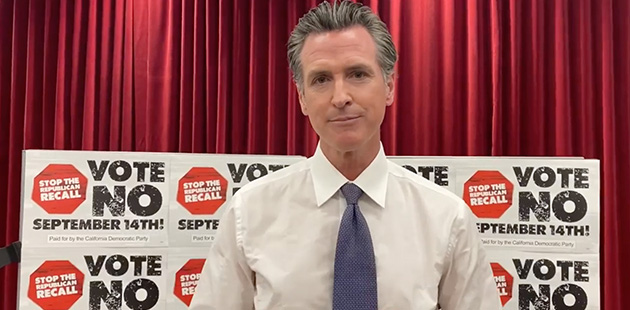Peacebuilding: A constructive pastime
Step aside Miss America hopefuls: There’s a new spokesman for world peace. Or rather, a new state.

California, one of our most notable social and political trendsetters, has agreed to endorse legislation to develop a U.S. Peace Department.
As of August 16th of this year, Congresswoman Barbara Lee’s Bill HR 1111, calling for a U.S. Department of Peacebuilding, has been officially backed by the California Democratic Party (CDP), along with many Democratic clubs (including the CDP Veterans Caucus) and peace-minded individuals.
Calling this a “Resolution Urging the United Nations and All Member States to Support Infrastructures For Peacebuilding Within and Externally Among Nations,” the CDP has worked together with many organizations and concerned citizens to bring this about.
PeaceNow, connected with many people of note — such as Sharon Stone, Shahin Mafi, and John Viscount — is one of those organizations. Their collection of signatures online is well on its way to reaching its goal of one billion signatures, and their impact has been noted worldwide, with volunteers from over 20 countries. Of the infrastructure required to make an almost mythical state of global conflict resolution possible, their resolution states the following goals for such government “ministries or departments of peace”:
- To establish peace as a primary organizing principle in society, both domestically and globally;
- To direct government policy towards non-violent resolution of conflict prior to escalation to violence and to seek peace by peaceful means in all conflict areas;
- To promote justice and democratic principles to expand human rights and the security of persons and their communities, consistent with the Universal Declaration of Human Rights, other related UN treaties and conventions, and the Declaration and Programme of Action on a Culture of Peace (1999);
- To promote disarmament and develop and strengthen non-military options for peacemaking and peacebuilding;
- To develop new approaches to non-violent intervention, and utilize constructive dialogue, mediation, and the peaceful resolution of conflict at home and abroad;
- To encourage the involvement in local, national, and global peace-building of local communities, faith groups, NGOs, and other civil society and business organizations;
- To facilitate the development of peace and reconciliation summits to promote non-violent communication and mutually beneficial solutions;
- To act as a resource for the creation and the gathering of best practices documents, lessons learned, and peace impact assessments;
- To provide for the training of all military and civilian personnel who administer post-war reconstruction and demobilization in war-torn societies; and
- To fund the development of peace education curriculum materials for use at all educational levels and to support university-level peace studies.

While the state of California may seem like a small victory, it has been a leader in human rights and liberty, usually touted as being so liberal as to earn names like the “Left” Coast. Its governing powers are no exception, which is certainly a bonus for those pushing for peaceful coalitions.
Tim Forkes, an editor and writer for the Los Angeles and Baltimore Post-Examiner, once campaigned for current Democratic California Governor, Jerry Brown, who ran for president in 1992. However, Forkes said that a little further back, in the ‘70s, “Governor Brown was known as Governor Moonbeam … because he was friends with a lot of California rock stars and identified with the anti-Vietnam War crowd.” Brown is still anti-war, and his party supports the same ideals.
What is Forkes’ reaction to the new legislation proposal? “It appears Governor Moonbeam is working his magic again.”
While political magic of sorts can change hearts and minds on the issue of a more peaceful reality, much work is needed before Peace Departments become a priority on our national “To Do” List. Civic activism is a must if government changes are to switch from the potential to the pragmatic solution to local and global conflict.
It is one thing to talk abstractly about establishing a “culture of peace,” but creating and maintaining “peaceful economies” practically goes against several statutes of the American dream, or at least the American lifestyle.
Living unselfishly, giving back to the community, and suppressing the self-serving tendency to act out in violence or opposition to perceived slights, is not the America many in our nation grew up within or even belief in. Many still cry “socialism” at claims of raising taxes for basic public services and claim that supporting our military means sending them off to war with heedless abandon.
Sadly, it seems as though the softest trait America has to offer at the moment is our political correctness in lieu of actual peaceful dialogue and reasonable exchanges.

For example, think back on our reactions to 9/11. Back in 2001, not many Americans would have entertained the notion of a peaceful dialogue with leaders from the Middle East. In fact, we didn’t even care enough to find out who was specifically responsible for our pain. We are a nation of action. But that doesn’t have to be negative, so long as we can back up that action with forethought, and follow it with dignity.
Nancy Merritt, a significant member of this movement, encourages supporters to take action by urging Congress members to cosponsor this legislation via emails to Barbara Lee at diala.jadallah@mail.house.gov, as well as signing the Global Petition for Peace Now.

Megan Wallin is a young writer with a background in the social sciences and an interest in seeking the extraordinary in the mundane. A Seattle native, she finds complaining about the constant drizzle and overabundance of Starbucks coffee therapeutic. With varied work experiences as a residential counselor, preprimary educator, musician, writing tutor and college newspaper reporter/editor, Megan is thrilled to offer a unique perspective through writing, research and open dialogue.

